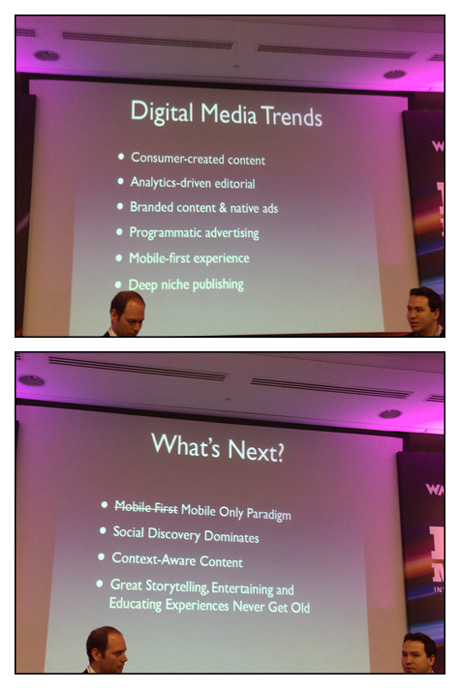
David Nemetz, founder of sports site Bleacher Report, is to launch a series of "deep-interest" sites that have an "educational aspect and a lifestyle aspect" by the end of the year.
Speaking at the WAN-IFRA Digital Media Europe conference in London today, Nemetz told delegates he was looking to follow the success of Bleacher Report by launching titles on science, history, nature, travel and other topics that readers find inspirational.
Bleacher Report launched in 2007, but now receives more than 70 million visitors and 1.2 billion page views each month.
"It's going to be very mobile-centric and highly visual," Nemetz told Journalism.co.uk, stressing that the project is still in its early stages.
"We have the benefit of seeing where things are going to – build our product to be mobile-first from the ground up – and not start on desktop and convert it to mobile," he said.
Social media will be the main distribution platform, he said, but engaging audiences in a different way from current trends.
"You see a lot of these newer sites taking some liberties with the social [media] system and users are starting to get fatigued," he said, "but social is still a powerful medium. It's just about how you engage with it in the right way."
As such, Nemetz is looking at different ways to approach "deeply-entrenched audiences who are deeply interested in these niche topics" and "reaching that audience where they are already comfortable but without tricking someone to get them to click on a headline".
Although Nemetz did not go into further detail on the finer points of the new product, some of the tenets of experimentation and use of analytics that have been central to Bleacher Report will be important.

Nemetz's opinions on digital media trends and what's next for the industry
Although Bleacher Report began as a contributor network, Nemetz found that focussing on analytics played a large role in both understanding the audience but also in adding a "gamification" element to "incentivise" contributors and writers, he said.
When the Bleacher Report began, Nemetz said many writers hugely underestimated their audience, so he began sharing the traffic figures to articles as a form of inspiration. By showing contributor's traffic figures and giving them 'badges' next to their byline for achieving certain milestones in traffic, social shares or comments, for example, it served as a psychological motivator.
"Money only motivates so much," he said. "People want to know that their work is having an impact and their reaching people.
"So creating feedback systems where people can see the result of that – even if it's a group of pixels in the shape of a trophy – that can have a big impact."
Bleacher Report now has "a couple of hundred" writers alongside thousands of contributors but the gamification system is still important for motivation, even for writers who recruited to Bleacher Report from high-end publications like the New York Times, he said.
Looking ahead, Nemetz said analytics and emerging trends will continue to play a role in how his publications will interact "internally and externally".
"We want to have a specific voice and point of view that will be different from other players," he said. "We target a younger audience, a mobile-centric, highly social audience, so we want to create content that is shareable and that can be consumed on the go, that sticks out as engaging and entertaining beyond the dry facts.
"We like to think of combining really smart creative people with great editorial instincts with the best metrics and tools that we can provide them with."
The new titles will be announced in further detail later this year.
Free daily newsletter
If you like our news and feature articles, you can sign up to receive our free daily (Mon-Fri) email newsletter (mobile friendly).
Related articles
- ‘Question your assumptions’: Tips from Quartz on preparing for what comes next in digital
- Don’t just shut the door: What publishers can do to combat ad-blocking
- Is curation the way forward? A Swiss media group's take on getting people to pay for regional news
- How Spain’s El País is responding to digital transformation
- Advice on audience development from Bleacher Report









